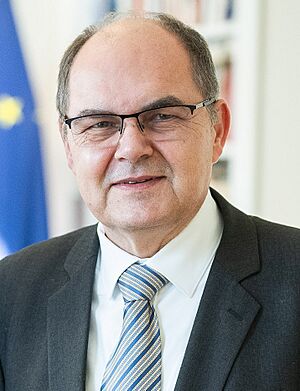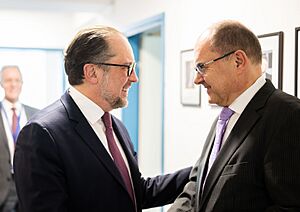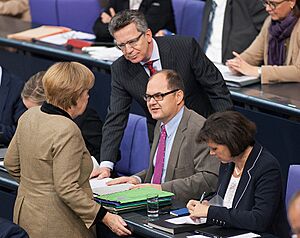Christian Schmidt facts for kids
Quick facts for kids
Christian Schmidt
|
|||||||||||||
|---|---|---|---|---|---|---|---|---|---|---|---|---|---|

Schmidt in 2024
|
|||||||||||||
| High Representative for Bosnia and Herzegovina | |||||||||||||
| Assumed office 1 August 2021 |
|||||||||||||
| Preceded by | Valentin Inzko | ||||||||||||
| Minister of Transport and Digital Infrastructure | |||||||||||||
|
Acting
|
|||||||||||||
| In office 24 October 2017 – 14 March 2018 |
|||||||||||||
| Chancellor | Angela Merkel | ||||||||||||
| Preceded by | Alexander Dobrindt | ||||||||||||
| Succeeded by | Andreas Scheuer | ||||||||||||
| Minister of Food and Agriculture | |||||||||||||
| In office 17 February 2014 – 14 March 2018 |
|||||||||||||
| Chancellor | Angela Merkel | ||||||||||||
| Preceded by | Hans-Peter Friedrich | ||||||||||||
| Succeeded by | Julia Klöckner | ||||||||||||
| Parliamentary State Secretary in the Ministry for Economic Cooperation and Development |
|||||||||||||
| In office 17 December 2013 – 17 February 2014 |
|||||||||||||
| Minister | Gerd Müller | ||||||||||||
| Preceded by | Gudrun Kopp | ||||||||||||
| Succeeded by | Thomas Silberhorn | ||||||||||||
| Parliamentary State Secretary in the Ministry of Defence |
|||||||||||||
| In office 23 November 2005 – 17 December 2013 |
|||||||||||||
| Minister | Franz Josef Jung Karl-Theodor zu Guttenberg Thomas de Maizière |
||||||||||||
| Preceded by | Walter Kolbow | ||||||||||||
| Succeeded by | Ralf Brauksiepe | ||||||||||||
|
|||||||||||||
| Personal details | |||||||||||||
| Born | 26 August 1957 Obernzenn, Bavaria, West Germany |
||||||||||||
| Political party | Christian Social Union | ||||||||||||
| Spouse |
Ria Hess
(m. 1989) |
||||||||||||
| Children | 2 | ||||||||||||
| Alma mater | University of Erlangen | ||||||||||||
| Profession | Lawyer | ||||||||||||
Hans Christian Friedrich Schmidt (born 26 August 1957) is a German politician from the Christian Social Union (CSU) party. Since August 2021, he has served as the High Representative for Bosnia and Herzegovina. This is an important international job to help keep peace in that country.
Before this role, Schmidt held several major positions in the German government. He was the Minister of Food and Agriculture from 2014 to 2018. He also worked as a top official in Germany's Ministry of Defence and Ministry for Economic Cooperation and Development. For over 30 years, from 1990 to 2021, he was a member of the Bundestag, Germany's parliament.
His appointment as High Representative has been controversial. Some countries, like Russia and China, and some leaders in Bosnia and Herzegovina do not see his appointment as valid. As High Representative, he has used his special powers to change rules about elections, which has led to both praise and criticism.
Contents
Early Life and Schooling
Christian Schmidt was born in Obernzenn, a town in the German state of Bavaria. He went to the Georg-Willhem-Steller-Gymnasium in Bad Windsheim and graduated in 1976. After high school, he served in the German army's mountain division.
In 1977, he started studying law at universities in Erlangen, Germany, and Lausanne, Switzerland. He passed his final law exams in 1985 and became a lawyer. He worked as a lawyer until he took on a major government role in 2005.
Political Career in Germany
Schmidt became interested in politics when he was a student. In 1973, he joined the youth group of the Christian Social Union (CSU), a major political party in Bavaria. He held several leadership positions in the youth group and the main party over the years.
From 1984 to 1990, he was a town council member in his hometown of Obernzenn. This gave him early experience in local government.
Member of Parliament (1990–2021)
In 1990, Schmidt was elected to the Bundestag, Germany's national parliament. He served as a member for 31 years, representing the district of Fürth.
During his time in parliament, he focused on foreign policy and defence. He was the head of groups that worked on building friendships between Germany and other countries, including Israel, Great Britain, and the Baltic nations. He played a key role in important agreements between Germany and its neighbors, Poland and the Czech Republic.
Working in Government Ministries

In 2005, Schmidt was appointed as a Parliamentary State Secretary in the Ministry of Defence. This is like being a top assistant to the head of the ministry. He worked with three different defence ministers and helped manage Germany's armed forces. He was involved in important decisions, such as the restructuring of the army and supporting soldiers who were injured or became sick during their service.
From 2014 to 2018, Schmidt became the Federal Minister of Food and Agriculture. In this role, he was in charge of Germany's farming policies. He dealt with challenges like falling milk prices, where he created a €100 million emergency plan to help dairy farmers. He also managed a major outbreak of bird flu, which required difficult decisions to stop the disease from spreading.
In 2017, he made a controversial decision about a weed killer called glyphosate. He voted to allow its use in the European Union, even though another German minister disagreed. This went against the government's usual rules and caused a public argument.
High Representative for Bosnia and Herzegovina
In 2021, Schmidt left German politics to take on a new international role. He became the High Representative for Bosnia and Herzegovina. The High Representative is an official appointed by the international community to oversee the peace agreement that ended the Bosnian War in 1995. This person has special powers, known as the "Bonn Powers," to make laws or remove officials who block progress.
Challenges and Controversies
Schmidt's appointment was not supported by everyone. Russia and China argued that he was not chosen correctly because the United Nations Security Council did not approve him. Some political leaders inside Bosnia and Herzegovina, especially from the Republika Srpska region, also refuse to recognize his authority.
Despite these challenges, Schmidt has used his powers several times.
- Election Law Changes: In 2022, right after the polls closed for a general election, he changed the country's election laws. He said the changes were needed to make the government work better. The changes were supported by the United States and the United Kingdom but were criticized by others who felt they deepened ethnic divisions.
- Government Formation: In 2023, after months of political stalemate, he used his powers to help form a new government in one of the country's two main regions, the Federation of Bosnia and Herzegovina.
- Rule of Law: When leaders in Republika Srpska tried to ignore rulings from the country's top court, Schmidt stepped in and cancelled their new laws, stating they violated the peace agreement.
These actions show how powerful and controversial the role of the High Representative can be.
Other Work and Recognition

Throughout his career, Schmidt has been involved in many organizations focused on foreign policy and international relations. He has been the president of the German Atlantic Society, which works to strengthen ties between Germany and North America.
He has also received several awards from different countries for his work in politics and diplomacy. These include:
- Cross of the Order of Merit from Germany (2005)
- Bavarian Order of Merit (2007)
- Order of Ante Starčević from Croatia (2013)
- Orders from Latvia and Lithuania
See also
 In Spanish: Christian Schmidt para niños
In Spanish: Christian Schmidt para niños
 | Tommie Smith |
 | Simone Manuel |
 | Shani Davis |
 | Simone Biles |
 | Alice Coachman |



